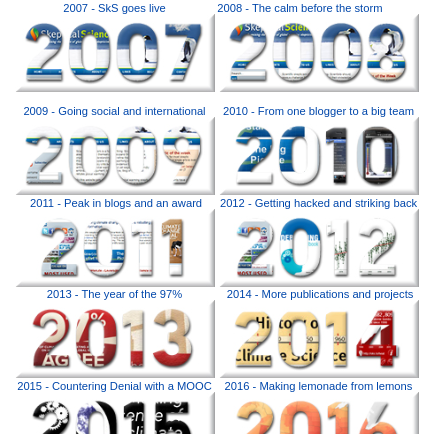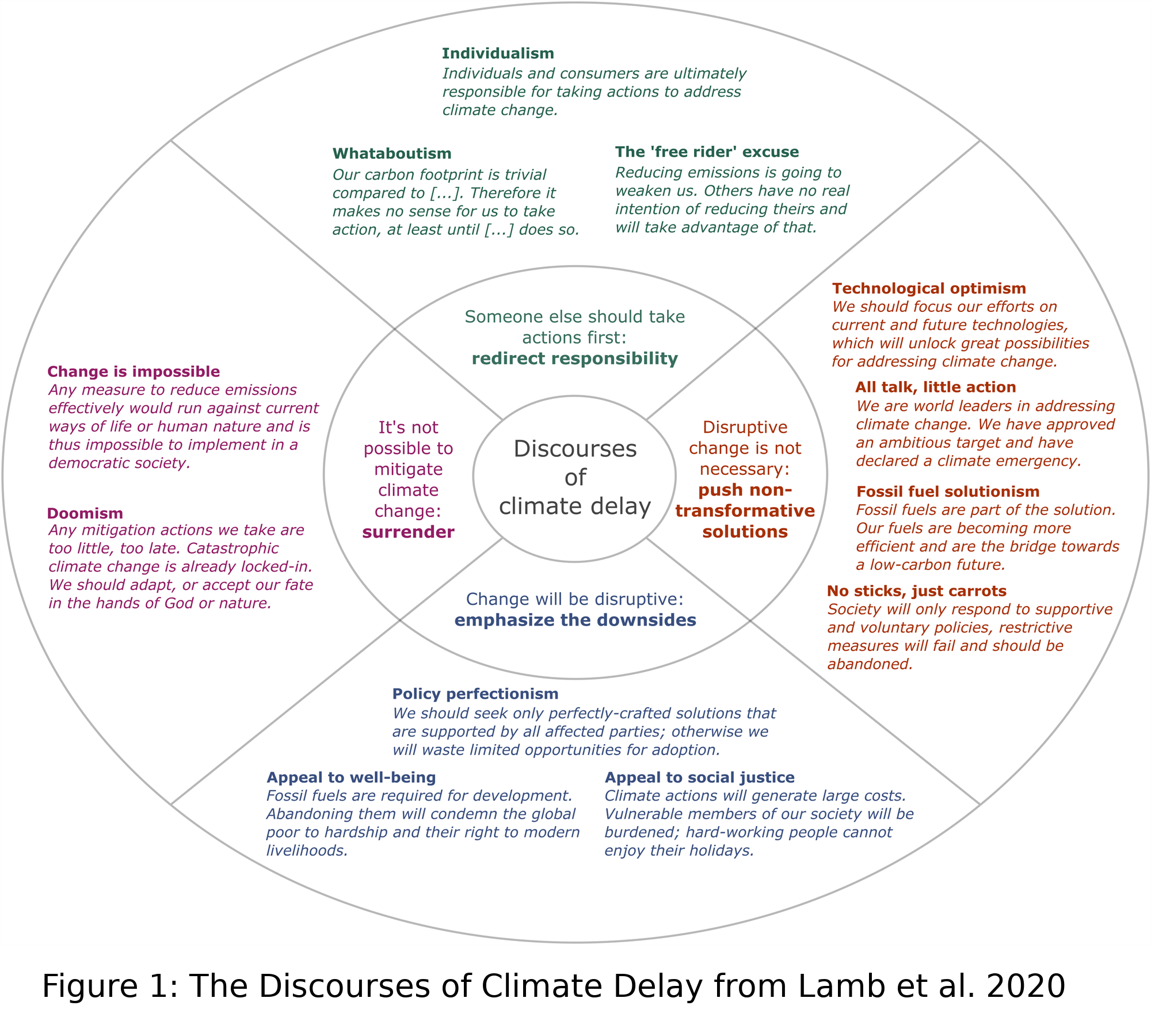 The roots of progress in handling our climate problem remain planted in scientific research, and so Skeptical Science has grounded our collection of rebuttals in academic research relevant and responsive to specific misconceptions.
The roots of progress in handling our climate problem remain planted in scientific research, and so Skeptical Science has grounded our collection of rebuttals in academic research relevant and responsive to specific misconceptions. Time flies. This coming summer will mark 15 years of Skeptical Science focusing its effort on "traditional" climate science denial. Leaving aside frivolities, we've devoted most of our effort to combatting "serious" denial falling into a handful of broad categories of fairly crisp misconceptions: "radiative physics is wrong," "geophysics is wrong," "modeling of geophysical systems is impossible," or "we're unable to measure geophysical behavior of the planet."
 The roots of progress in handling our climate problem remain planted in scientific research, and so Skeptical Science has grounded our collection of rebuttals in academic research relevant and responsive to specific misconceptions.
The roots of progress in handling our climate problem remain planted in scientific research, and so Skeptical Science has grounded our collection of rebuttals in academic research relevant and responsive to specific misconceptions.
All of this activity has been centered on a single enduring objective by a narrow interest group, the pursuit of which creates a dire conflict. The purpose of the fossil fuel industry is to monetize fossil fuel resources. Every year that goes by without modernizing our energy systems past a fossilized condition affords more monetization. Delay is profit. This laser-focus on financial results and resultant requirement to arrest progress is in direct conflict with what's healthy for our planet and everything living upon it.
Societal responses to our fossil fuel problem require replies in public policy and governance. This ignites objections rooted in political ideology, bringing more money and energy to arguing for remaining stuck with Victorian-era energy thinking. Research tells us that political ideology is a major impetus for climate science denial. This is a potent catalyst for amplifying deceptive messaging in favor of special interests and has prolonged our paralysis over climate change.
Reflected in everything we do, Skeptical Science's mission— our purpose— is to help resolve the conflict between fossil fuels and our need for progress, by anchoring disagreements in the science describing our reality. We directly address intentionally fostered misunderstandings of climate science, and expose ideologically-motivated disagreement masquerading as scientific disputes. We do this by distilling academic research and packaging it in articles intelligible for a general audience. Not only can we directly answer questions in this way, but also our users can more efficiently use their own time by not wasting it on duplicative effort— thereby amplifying their own positive effect.
From various web access statistics Skeptical Science sees how (somewhat mind-bogglingly) traditional climate fables live on, seemingly indestructible. As a single example, every day hundreds of people read here at Skeptical Science that the 2nd law of thermodynamics does not contradict the effect of increasing CO2 in our atmosphere. Our encyclopedic roster of rebuttals to climate science avoidance continues to be useful, unfortunately.
But— increasingly— we see new challenges of denial and delay emerging and gaining prominence. Perhaps thanks to massive collective effort and some genuine success communicating truth about our role in Earth's climate, the nature of bogus arguments we see is evolving.
Mounting evidence of rapid and acutely hazardous climate change now and in the future is in plain view. Scientific consensus on climate change leads to societal consilience and broad agreement that change is necessary. Old-fashioned science denial no longer functions in our "mood of the room." To the extent legacy energy industries are able to shape events, tactical shifts are called for to support the strategic goal of prolonging monetization of fossil fuels.
Again, delay is profit.
Unsurprisingly given the history we've lived— and what we'd thus fully expect to see as a continuum— we're now encountering freshly invented and refined sticking points and evasive maneuvers prolonging the monetization window for fossil fuels, features formally termed "discourses of climate delay" (Lamb et al. 2020). Some of these tactics are not within the reach of Skeptical Science's toolbox and are better handled elsewhere. However, other discourses of delay are amenable to being yanked back into reality by reattachment to primary sources.
For Skeptical Science, "primary source" translates to "peer reviewed research publications." Tactical manifestation of solutions denial found in claims such as "EVs pollute more than IC-powered vehicles," or "[exciting but nonexistent technology] will solve our problems" can often be shown as empty arguments from the standpoint of science.
The same unholy alliance between industrial interests and ideological predilections especially pertains as we confront our need for climate remedy. Effective climate mitigation (aka "solutions") may require intervention by regulation, awakening ideological opposition, and thereby producing a loud chorus of "wrong." Ideologically-rooted arguments against confronting our climate problem are susceptible of exposure by comparison with what science tells us from a perspective of ideological neutrality.

Not long ago, Bärbel Winkler introduced discourses of climate delay as a subject area of focus for Skeptical Science. Since that initial foray, we've spent more time discussing this in terms of how it stacks up in our priorities. It's a high priority; confusion over mitigation of our climate impacts is dangerous and needs to be handled in an organized fashion. Consequently:
This process leads to an opportunity to seek help from our readers.
Which "discourses of climate delay" do you think we should prioritize? Which misconceptions of solution denial do you often hear repeated? Let us know in comments here, or via our contact form.
Posted by Doug Bostrom on Friday, 17 June, 2022
 |
The Skeptical Science website by Skeptical Science is licensed under a Creative Commons Attribution 3.0 Unported License. |